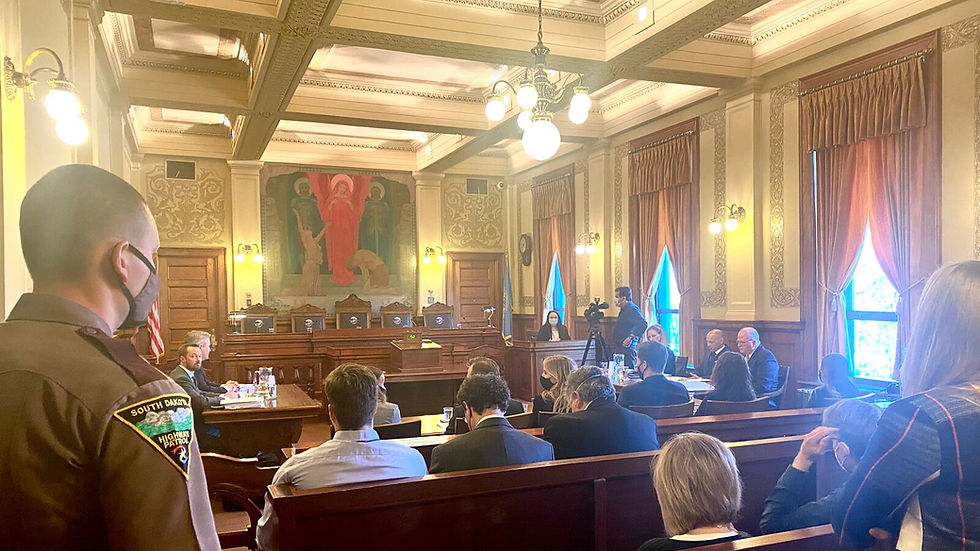Analyzing the Joseph Daniel LeFors v. Krista Mae LeFors South Dakota Supreme Court Decision: TRICARE
- Eric Schlimgen

- May 26, 2023
- 3 min read
In a landmark case, the South Dakota Supreme Court recently rendered a significant decision in Joseph Daniel LeFors v. Krista Mae LeFors, involving TRICARE, spousal separation, and a range of pivotal legal issues. This ruling has far-reaching implications for military families (including National Guard and Active Military . . . and potentially any position that has benefits after some term of years), legal precedents, and the interpretation of benefits in cases of marital dissolution. In this blog post, we delve into the details of the case, its background, the legal arguments, and the implications of the court's decision.
Background: Joseph and Krista Mae LeFors were a married couple residing in South Dakota, with Joseph serving in the United States military. As a military spouse, Krista Mae was entitled to healthcare coverage under TRICARE, the military's health insurance program. However, the couple decided to separate, leading to a complex legal battle over the continuation of Krista Mae's TRICARE benefits.
Legal Arguments: The primary legal issue in this case revolved around the interpretation of TRICARE benefits in situations of spousal separation. Joseph argued that since the couple had separated, Krista Mae should no longer be eligible for TRICARE coverage. He contended that the language of the TRICARE policy clearly stated that coverage would terminate upon separation or divorce.
On the other hand, Krista Mae argued that the termination of TRICARE benefits upon separation violated her rights as a military spouse. She maintained that such a termination would be detrimental to her access to healthcare, especially considering the potential financial burden of obtaining private insurance.
Key Legal Issues:
Interpretation of TRICARE Policy: The court had to analyze the language and intent of the TRICARE policy to determine whether the termination of benefits upon separation was explicitly stated or subject to interpretation.
Rights of Military Spouses: The case raised important questions about the rights of military spouses and their entitlement to healthcare benefits during periods of separation. It required the court to examine the scope of these rights and how they should be protected under the law.
Implications for Spousal Support: The court also had to consider whether the termination of TRICARE benefits upon separation would impact the determination of spousal support in the divorce proceedings. This aspect introduced a significant financial dimension to the case.
The Court's Decision: After careful consideration of the arguments and legal issues at hand, the South Dakota Supreme Court ruled in favor of Krista Mae LeFors. The court determined that the TRICARE policy did not explicitly state that benefits should terminate upon separation. Instead, it found that the language of the policy allowed for a broader interpretation that would safeguard the healthcare rights of military spouses during periods of separation.
Implications and Significance: The Joseph Daniel LeFors v. Krista Mae LeFors decision carries significant implications for military families and the interpretation of TRICARE benefits. By affirming the rights of military spouses to maintain healthcare coverage during separation, the court has recognized the unique challenges faced by these individuals and their need for uninterrupted access to medical services. The court disregarded the argument that a military member could face sanctions for having a relationship while still legally married and did not find a fundamental right to divorce.
Furthermore, this ruling sets an important precedent for other cases involving the interpretation of TRICARE benefits, spousal separation, and divorce. It establishes a legal framework that prioritizes the welfare and healthcare rights of military spouses, potentially influencing future decisions in similar contexts.
Conclusion: The Joseph Daniel LeFors v. Krista Mae LeFors South Dakota Supreme Court decision represents a significant milestone in the realm of TRICARE benefits, spousal separation, and the legal rights of military spouses. By ruling in favor of Krista Mae LeFors, the court ordered two persons to stay married for a period of time to have benefits accrue and found there is no fundamental right to divorce . . . a far reaching decision for all spouses that could obtain benefits at some period of time.





Comments